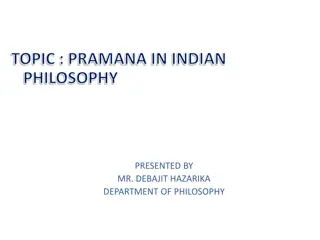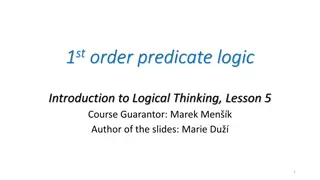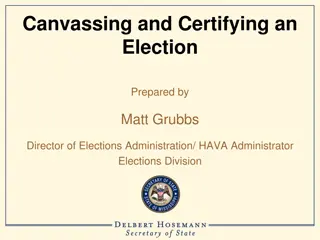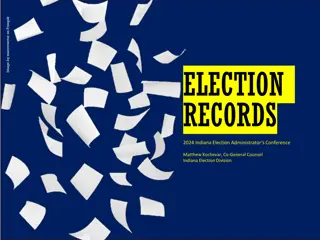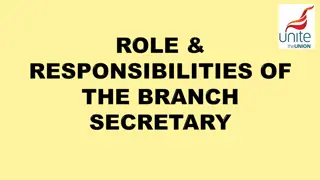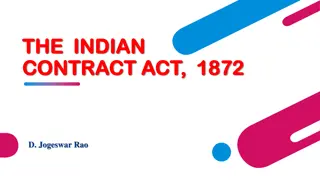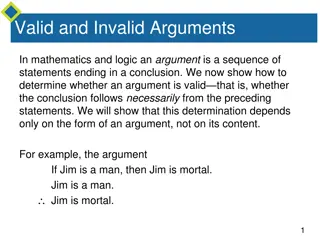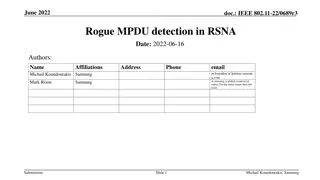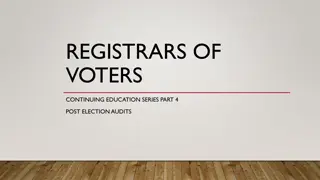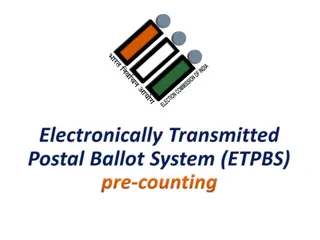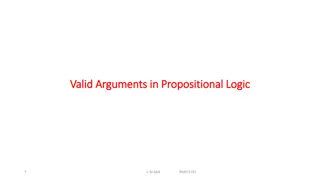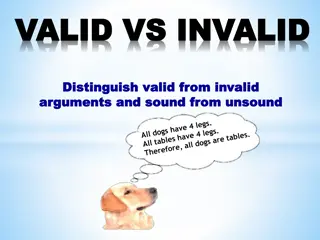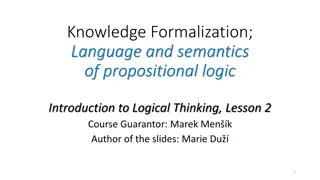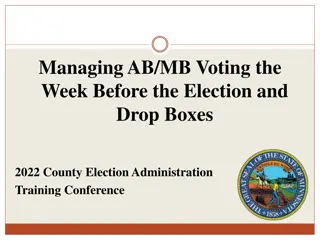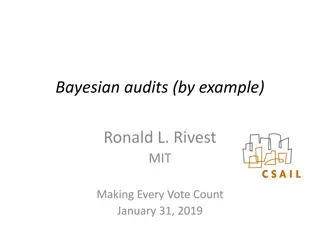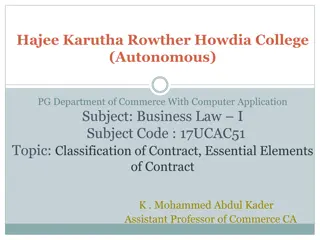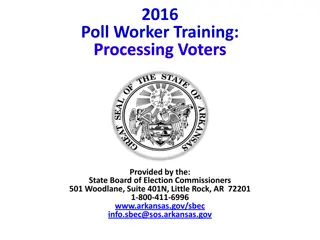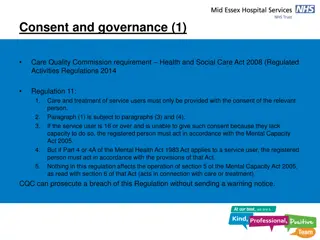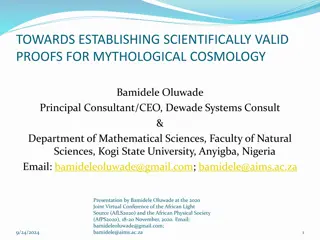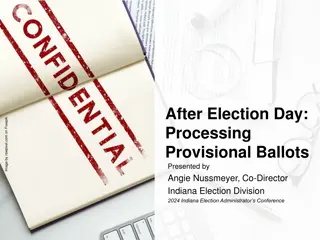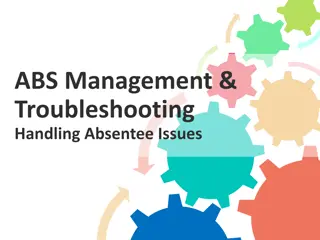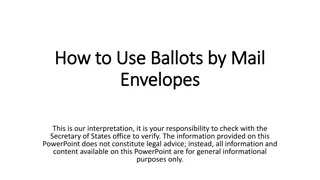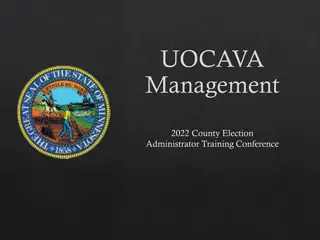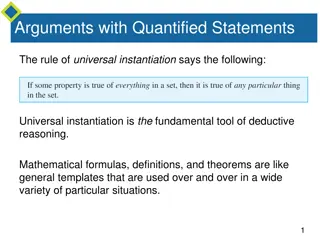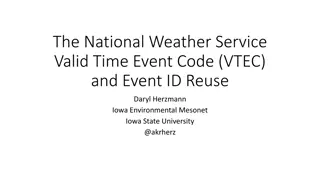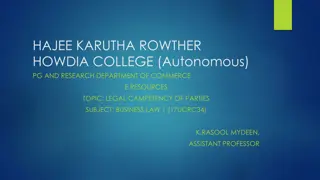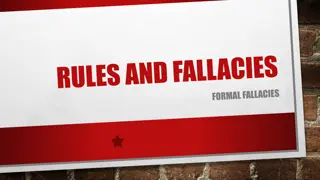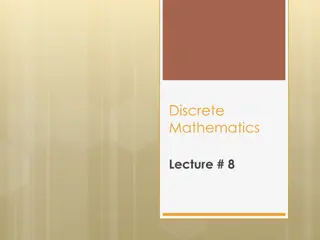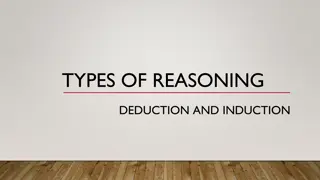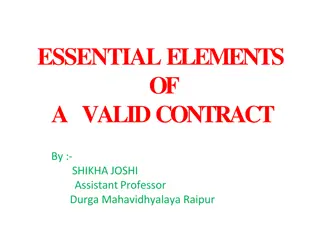REVme Closing Report - July 2023
The closing report for IEEE 802.11-23/1273r1 in July 2023 includes completion of work, plans for September, recirculation motion, conditional approval for SA Ballot, and an ad-hoc meeting authorization. Key decisions were made regarding document approvals, recirculation ballots, and SA Ballot proces
0 views • 8 slides
Postal Ballot Guidance Plan: Understanding Exceptions and Entitlements
The guidance plan delves into the exceptions to the voting in-person norm, focusing on Postal Ballot as an alternative method. It covers the entitlement categories of voters, such as Service Voters, Special Voters, and those under Preventive Detention. The presentation details the process of prepara
1 views • 63 slides
Understanding Post-Election Risk-Limiting Audits in Indiana
Indiana's post-election audits, overseen by the Voting System Technical Oversight Program, utilize statistical methods to verify election outcomes, ensuring accuracy and reliability in the electoral process. The VSTOP team, led by experts in various fields, conducts audits based on Indiana Code IC 3
0 views • 12 slides
Understanding Pramana in Indian Philosophy by Mr. Debajit Hazarika
Philosophy delves into the quest for knowledge, with Epistemology exploring sources and validity. In Indian philosophy, Prama signifies true cognition, attainable through Pramana - the means to achieve valid knowledge. This discussion covers the six pramanas within various philosophical systems and
2 views • 11 slides
Introduction to 1st Order Predicate Logic in Logical Thinking
Explore the limitations of propositional logic and the enhanced expressive power of 1st order predicate logic (PL1). Understand how PL1 allows for analyzing the structure of atomic propositions and proving arguments that depend on these structures. Through examples and valid argument schemata, delve
1 views • 26 slides
Understanding Generalization: Facts, Opinions, and Validity
Exploring the concept of generalization, this content distinguishes between facts, opinions, and valid generalizations. It emphasizes how generalizations are broad statements based on information and experiences, while facts can be proven true and opinions are belief-based. Key words and examples ar
1 views • 8 slides
Understanding Generalizations and Differentiating Between Valid and Faulty Ones
Generalizations are broad statements about groups of people or things sharing common traits. While some generalizations can be valid, supported by facts and logic, others may be faulty, lacking evidence and prone to inaccuracies. It's essential to use clue words like "all," "always," and "never" cau
1 views • 10 slides
Canvassing and Certifying an Election Process Steps
Various steps involved in canvassing and certifying an election, including verifying ballot boxes, returning manager documents, affidavit processing, absentee ballot review, and reconciling absentee ballots. These steps ensure proper documentation and handling of election materials to maintain the i
0 views • 27 slides
Public Records Regulations in Indiana Elections
Indiana's public records laws dictate that most agency records, including election materials, are publicly accessible. However, certain voter registration and election records have exemptions. The rules cover the availability of records related to voter registration, election administration, and pos
0 views • 12 slides
Roles and Responsibilities of Unite the Union Branch Secretary Election Candidates
Fulfilling the position of Branch Secretary in Unite the Union requires candidates to take control of office operations, maintain financial records, organize ballots, promote and lead campaigns, and adhere to union rules while being honest and seeking guidance when needed. In addition, workplace rep
0 views • 7 slides
Understanding the Indian Contract Act of 1872
The Indian Contract Act of 1872 is a significant legislation that governs contracts and agreements in India, excluding Jammu and Kashmir. It defines terms like contract, agreement, offer, and acceptance while outlining the essential elements required for a valid contract. The Act distinguishes betwe
0 views • 15 slides
Understanding Valid and Invalid Arguments in Mathematics and Logic
In mathematics and logic, determining the validity of an argument depends on its form rather than its content. An argument is considered valid if the conclusion necessarily follows from the premises. This determination involves analyzing the abstract form of the argument, constructing truth tables t
0 views • 32 slides
Rogue MPDU Detection in RSNA Issues and Solutions
Abstract CIDs highlighted issues related to valid MPDUs not being acknowledged due to malicious attacks in RSNA. Efforts were made to enhance security using Protected Block Ack, but vulnerabilities persist. Various solutions are being explored, and input from group members is sought to find the best
2 views • 12 slides
Understanding Post-Election Audits for Registrars of Voters
Post-election audits are essential for ensuring the accuracy and functionality of optical scan voting machines. This process involves randomly selecting voting districts for hand count audits to assess machine performance. The chain of custody must be strictly maintained for ballots and equipment. M
0 views • 18 slides
Electoral Ballot Pre-Counting Procedures
Learn the detailed steps involved in the pre-counting process of electoral ballots, including scanning forms, verifying documents, and handling discrepancies using QR code technology. Follow along to ensure accurate counting and validation of service voter documents. Get insights into the systematic
6 views • 18 slides
Understanding Valid Arguments in Propositional Logic
An argument in propositional logic consists of premises leading to a conclusion. Valid arguments are those where the truth of the premises implies the truth of the conclusion. To determine validity, you can construct a truth table to check if the conclusion always holds when all premises are true. T
0 views • 9 slides
Understanding Valid and Invalid Arguments in Logic
In logic, arguments consist of premises supporting a conclusion, with deductive arguments claiming logical necessity. Valid arguments have premises implying the conclusion, making them deductively valid. For example, if all actors are robots and Tom Cruise is an actor, then logically Tom Cruise must
0 views • 25 slides
Introduction to Formalization and Valid Reasoning in Logic
Understanding the need for formalizing natural language in logic to eliminate ambiguities and vagueness. Exploring valid forms of reasoning and how logical rules help in automating correct arguments. Introducing propositional and predicate logic systems with examples of valid arguments.
0 views • 23 slides
Managing AB/MB Voting Activities Before Election Week
Activities involved in managing AB/MB voting the week before an election include receiving and organizing ballots, central counting process, processing AB applications and voter registrations. There is a focus on ballot security, chain of custody, and staff responsibilities in handling and counting
2 views • 12 slides
Understanding Bayesian Audits in Election Processes
Bayesian audits, introduced by Ronald L. Rivest, offer a method to validate election results by sampling and analyzing paper ballots. They address the probability of incorrect winners being accepted and the upset probability of reported winners losing if all ballots were examined. The Bayesian metho
2 views • 7 slides
Understanding Contracts: Classification and Essential Elements
A contract is an agreement between parties to perform certain obligations. This article explores the classification of contracts based on enforceability, formation, and performance. It discusses the essential elements of a valid contract, types of contracts such as valid, void, voidable, illegal, an
0 views • 33 slides
Poll Worker Training Guidelines for Voter Processing
Training guidelines for poll workers provided by the State Board of Election Commissioners focus on key aspects such as handling voter eligibility, primary elections, voter identification, and steps for processing voters during voting hours. The guidelines emphasize not turning away any voter, handl
0 views • 31 slides
Understanding Consent and Governance in Health and Social Care
The Health and Social Care Act 2008 outlines the importance of obtaining consent for the care and treatment of service users, incorporating regulations from the Mental Capacity Act 2005 and Mental Health Act 1983 where necessary. The Francis report emphasizes the need for informed consent or lawful
0 views • 33 slides
Towards Establishing Scientifically Valid Proofs for Mythological Cosmology by Bamidele Oluwade
This presentation by Bamidele Oluwade explores the research on mythological cosmology, aiming to provide scientifically valid proofs for metaphysical phenomena through mathematical models and standard methods of proof in mathematics, supported by scientific/thought experiments and results from vario
0 views • 45 slides
Overview of Indian Contract Act 1872 and Essential Contract Law Principles
This detailed content provides insights into the Indian Contract Act 1872, essential principles of contract law including valid contracts, classification of contracts, essentials of a valid offer, and legal rules of acceptance. It covers topics such as enforceability, legal obligations, valid contra
0 views • 9 slides
Understanding Provisional Ballots in Indiana Elections
Exploring the process of processing provisional ballots in Indiana elections, including the categories for their use, additional use cases, requirements for issuance, and circumstances in which they must be offered. Key details include voter eligibility criteria, identification requirements, and pro
0 views • 12 slides
Troubleshooting and Management of Absentee Voting: Practical Solutions
Learn about handling absentee voter issues before and on Election Day, including troubleshooting rejected applications, reissuing ballots, and resolving absentee ballot delivery problems. Understand the procedures for recasting replacement ballots, submitting additional residency documentation, and
0 views • 21 slides
Understanding Ballot Layouts and Types for Elections in Indiana
Explore the various ballot layouts and types for elections in Indiana, including primary and general elections, with a focus on different variations such as D & R primary ballots, local public question-only ballots, and federal-only ballots. Learn how to prepare ballots for different scenarios and u
0 views • 9 slides
Guidelines for Using Mail Ballots and Returning Them
In this guide, you will find instructions on using mail-in ballots and envelopes to cast your vote. Remember to verify with the Secretary of State's office. Ensure you have received all necessary items in the mail, and if anything is missing, contact the provided office number. After voting, mail yo
0 views • 6 slides
Understanding Sample Ballots: Production, Distribution, and Naming Process
Explore the significance of sample ballots in elections, detailing how they are produced, distributed, and named. Discover their usage, importance for different elections, creators, and the methods of delivery to election administration systems. Learn about file naming conventions, ballot vendor inv
0 views • 14 slides
UOCAVA Management Insights for County Election Administrators
Gain valuable insights into the management of Uniformed and Overseas Citizens Absentee Voting Act (UOCAVA) ballots at the County Election Administrator Training Conference. Learn about the process of accepting and rejecting UOCAVA ballots, the importance of timeliness in corresponding with voters, a
0 views • 10 slides
Overview of Turning Maps into Ballots Process for Michigan Elections
Learn about the process of turning maps into ballots for Michigan elections, including tasks, timelines, and the role of the Bureau of Elections and the Qualified Voter File (QVF). Understand how the Michigan Independent Citizens Redistricting Commission completes districts for State House, Senate,
0 views • 7 slides
Understanding Universal Instantiation in Deductive Reasoning
Universal instantiation is a crucial tool in deductive reasoning, allowing us to derive specific conclusions from general statements. By combining universal instantiation with modus ponens and modus tollens, we can construct valid arguments such as universal modus ponens and universal modus tollens.
0 views • 13 slides
Understanding the National Weather Service Valid Time Event Code (VTEC)
Explore the evolution of the National Weather Service Valid Time Event Code (VTEC) system introduced in 2005 by Daryl Herzmann at Iowa State University. Learn about the importance of VTEC in weather alerts and how it revolutionized the dissemination of critical weather information. Dive into example
0 views • 10 slides
Legal Competency of Parties in Business Law: Understanding Capacity to Contract
Capacity to contract is crucial in business law, ensuring parties are competent to enter valid agreements. Minors, persons of unsound mind, and those disqualified by law lack competency to contract. In India, minors under 18 years cannot enter valid contracts, and contracts by minors are void. Howev
0 views • 10 slides
Rules and Fallacies in Valid Syllogisms
Valid syllogisms must adhere to specific rules to avoid committing formal fallacies. These rules include distribution, quality, and quantity concepts. Breaking these rules can lead to fallacies such as undistributed middle, illicit major, and illicit minor. Examples are provided to illustrate these
0 views • 18 slides
Understanding Valid and Invalid Arguments in Discrete Mathematics
Concepts of valid and invalid arguments in discrete mathematics are explored through examples. Learn how to determine the validity of arguments based on premises and conclusions. Practice using truth tables to evaluate argument forms. Enhance your logical reasoning skills in Discrete Mathematics.
0 views • 22 slides
Understanding Provisional Ballots in Indiana Elections
Learn about provisional ballots in Indiana elections, including when to issue them, common errors, and categories for voter eligibility. Explore insights on offering provisional ballots during in-person voting and on Election Day, as well as challenges faced by poll workers and voters. Discover key
0 views • 24 slides
TYPES OF REASONING DEDUCTION AND INDUCTION
Reasoning involves a connected sequence of thoughts leading to a conclusion. Deductive reasoning moves from general to specific, identifying assumptions and hidden premises. Categorical syllogisms demonstrate valid and sound argument structures, while real-life arguments may require uncovering assum
0 views • 21 slides
Understanding Essential Elements of a Valid Contract
A valid contract requires key elements such as offer and acceptance, intention to create legal relations, lawful consideration, and competency of the parties. An agreement becomes enforceable at law only when it possesses these essential elements. The article discusses these elements along with rele
0 views • 10 slides



